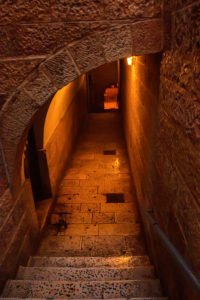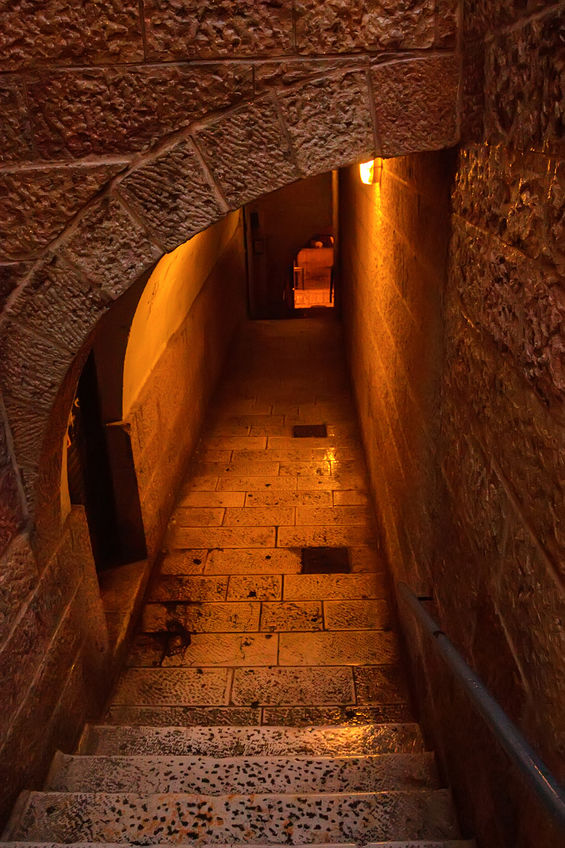
Bill W., the cofounder of Alcoholic Anonymous, heralded the compromise of ‘God as we understood Him’ as “The great contribution of our atheists and agnostics. They had widened our gateway so that all who suffer might pass through, regardless of their belief or lack of belief.” Yet he also personally met weekly with Monsignor Fulton Sheen for the better part of a year and took his instruction seriously. Ultimately he did not convert to Catholicism, irked by how all organized religions “claim how confoundedly right all of them are.”
Every time this dubious principle of religious rightness takes a firm grip on men’s minds, there is hell to pay, literally. In a sense, it’s worse than nationalistic rightness or economic rightness, those scourges of the moment. The ungodly might not be expected to know any better. But men of religion should. Yet history shows that they just don’t. It seems to me that the great religions survive because of their spirituality and in spite of their infallibility.
He was also hesitant to convert because he was seen as a symbol of A.A. “And A.A. as a whole does not make any endorsements or commitments. There is the rub.” He lamented churches didn’t have a fellow-traveler department: “Oh, if the church only had a fellow-traveler department, a cozy spot where one could warm his hands at the fire and bite off only as much as he could swallow. Maybe I’m just one more shopper looking for a bargain on that virtue—obedience!”
Ultimately, it seems Bill hesitated because Christianity requires a complete commitment to Christ; there is no fellow-traveler department: “I am the way, and the truth, and the life. No one come to the Father except through me” (John 14:6). In New Wine: The Spiritual Roots of the Twelve Step Miracle, Mel B. said that Bill took the broad view that there were many paths to spiritual experience and growth; and he did not think adherence to Christian religion was a prerequisite. In a personal communication to Mel, Bill said while Christ was the leading figure to him:
Yet I have never been able to receive complete assurance that He was one hundred percent God. I seem to be just as comfortable with the figure of ninety-nine percent. I know that from a conservative Christian point of view, this is a terrific heresy.
This cozy spot by the fire, where someone could warm his hands and only take as much as he could swallow, is known as nominal discipleship—something not possible for a follower of Christ. In Matthew 7:13-14, Jesus said: “Enter by the narrow gate. For the gate is wide and the way is easy that leads to destruction, and those who enter by it are many. For the gate is narrow and the way is hard that leads to life, and those who find it are few.” Note the formal structure of the verses, beginning with the command to enter by the narrow gate:
Enter by the narrow gate.
For the gate is wide and the way is easy
that leads to destruction,
and those who enter by it are many.
For the gate is narrow and the way is hard
that leads to life,
and those who find it are few.
This passage begins the concluding section of the Sermon on the Mount, where Jesus clearly says there are only two ways of life. The three illustrations that follow contrast those who select the narrow rather than the wide gate (13-14), those who bear good fruit rather than bad (15-23) and those who build their homes on solid rock rather than sinking sand (24-27). The contrast of this “two-ways” genre is found in other Jewish literature (2 Esdras 7:1-16), the Old Testament (Deuteronomy 30:19; Jeremiah 21:8), and early Christian literature (Didache 1:1; Epistle of Barnabas 18:1). Craig Blomberg in his commentary on Matthew said: “By these three illustrations, Jesus makes plain that there are ultimately only two categories of people in the world, despite the endless gradations we might otherwise perceive.” In his commentary on Matthew, John Nolland said:
Matthew has probably chosen the imagery of narrowness to suggest the constriction of one’s choices involved in taking the challenge of Jesus’ teaching: there is a very sharply defined mode of entry. The narrow gate throws up images of the need to make a choice which is not obvious (this is not where the crowd is going to go), to be attentive to where the gate is located, perhaps to experience the discomfort of squeezing through a narrow space, and possibly to wait patiently while others are going through the gate.The alternative to the narrow gate is a wide gate: the unstated assumptions are that everyone must go through a gate and end up somewhere and that only two gates exist. The default choice is clearly seen to be the wide gate: a wide gate beckons in a way that a narrow gate does not; a wide gate suggests an important destination; a wide gate (such as the main gate of a city) is set up to deal with the movement of large numbers of people.
But Bill W. and A.A. were not trying to promote a broader, easier way to Christ. They sought to “widened our gateway so that all who suffer might pass through, regardless of their belief or lack of belief.” They sought to follow the distinction made by William James in The Varieties of Religious Experience between personal and institutional religion. He defined personal religion/spirituality for his purposes as “the feelings, acts, and experiences of [the] individual . . . in their solitude, so far as they apprehend themselves to stand in relation to whatever they may consider the divine.” In the broadest sense possible, this religion or spirituality consisted of the belief that there was an unseen order to existence and supreme good lay in harmoniously adjusting to that order.
Worship, sacrifice, ritual, theology, ceremony, and ecclesiastical organization were the essentials of institutional religion. Limited to such a view, religion could be viewed as an external art of winning the favor of the gods. Within the personal dimension of religion, the inner dispositions of human conscience, helplessness, and incompleteness were of central importance. Here the external structures for winning divine favor took a secondary place to a heart-to-heart encounter between the individual and his or her maker.
Bill’s view of religion fits within this Jamesean distinction between personal and institutional religion—a distinction we see today as spiritual and religious. The widened gateway for the Twelve Steps of ‘God as we understood Him’ is consistent with the wide gate Jesus described in Matthew 7:13. It is not the way to life. However, it does provide a way to abstinence—a way out from the powerlessness of alcohol and drugs. It will crisscross the narrow way at many points, but needs to be seen as a distinct path. See “A Common Spiritual Path” and the other reflections under the category link “Romans Road to Recovery” for more on this issue.
There is a way and a gate that leads to life and a way and a gate that leads to destruction. The wide gate and way is easy, leading to destruction, while the narrow way and gate is hard, leading to life. Many find the wide gate, but few find the narrow one.
This is part of a series of reflections dedicated to the memory of Audrey Conn, whose questions reminded me of my intention to look at the various ways the Sermon on the Mount applies to Alcoholics Anonymous and recovery. If you’re interested in more, look under the category link “Sermon on the Mount.”





